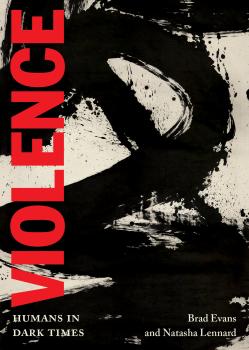Brad Evans
Список книг автора Brad EvansAtrocity Exhibition
A collection of writings, reflections, and interviews from political philosopher and critical theorist Brad Evans, written between 2010 and 2017. Evans collaborates with and interviews Simon Critchley, Julian Reid, Adrian Parr, Henry Giroux, Grace Pollock, Tyler Pollard, and Victoria Harper in his considerations of our era of violence and confusion. Brad Evans has studied and written about the history of violence for years and has been collaborating with and interviewing the world’s greatest artists, humanists, and philosophers about the human propensity for violence.
Violence
There are a number of anthologies on violence, but none exist as presented in this conversational interview format, which provides a meaningful and sophisticated introduction into the most cutting-edge thinking on the problem of violence in the contemporary world. The market for this book includes readers of the New York Times , as half of these conversations were first published in their online philosophy column «The Stone.» The other half come from the Los Angeles Review of Books . The issue of violence cuts across many disciplines of study and inquiry, and this book connects them through the eclectic range of thinkers, filmmakers, artists, and theorists with whom Evans and Lennard speak. Brad Evans has gained more public recognition in the U.S. given his editorial work on the New York Times's «The Stone.» Natasha Lennard's work is well-known as she regularly contributes to Esquire , The Intercept , The Nation , and the New York Times .
Disposable Futures
Brad Evans is an emerging voice in radical theory circles who will resonate with the market of public intellectuals like Slavoj Zizek—established intellectuals who command large trade readerships through popular culture.Accessible and serious, fans of the classic Guy Debord book «Society of the Spectacle» will flock to this title. Evans has a close association with Simon Critchley with whom he co-directed the 2012 film «Ten Years of Terror,» which received international acclaim and a screening at The Guggenheim in NYC. (Critchley launched the New York Times's philosophy section, «The Stone.»)Evans is the driving force behind the «Histories of Violence» website (http://historiesofviolence.com) and his co-authorship with Giroux on features for Truthout is helping build a profile in the blogsphere.Evans is a young, prolific, well-connected Brit with a very distinctive 007 look. (Seriously!)Henry Giroux's influence is growing and the readership for his political writing continues to increase as a result of his involvement with Truthout for which he regularly contributes long-form feature pieces that a amass thousands of «likes» within days of posting. His pieces migrate fast, and appear on Huffington Post, Counterpunch and TruthDig.
Portraits of Violence
Bringing together established academics and award-winning comic book writers and illustrators, Portraits of Violence illustrates the most compelling ideas and episodes in the critique of violence. Hannah Arendt, Franz Fanon, Jacques Derrida, Edward Said, Paolo Freire, Michel Foucault, Susan Sontag, Noam Chomsky, Judith Butler, and Giorgio Agamben each have ten pages to tell their story in this innovative graphic title. Dr. Brad Evans is a political philosopher, critical theorist and author from the University of Bristol, United Kingdom. Sean Michael Wilson is an acclaimed comic book writer with more than a dozen books published with a variety of US, UK, and Japanese publishers.
Liberal Terror
Security is meant to make the world safer. Yet despite living in the most secure of times, we see endangerment everywhere. Whether it is the threat of another devastating terrorist attacks, a natural disaster or unexpected catastrophe, anxieties and fears define the global political age. While liberal governments and security agencies have responded by advocating a new catastrophic topography of interconnected planetary endangerment, our desire to securitize everything has rendered all things potentially terrifying. This is the fateful paradox of contemporary liberal rule. The more we seek to secure, the more our imaginaries of threat proliferate. Nothing can therefore be left to chance. For everything has the potential to be truly catastrophic. Such is the emerging state of terror normality we find ourselves in today. This illuminating book by Brad Evans provides a critical evaluation of the wide ranging terrors which are deemed threatening to advanced liberal societies. Moving beyond the assumption that liberalism is integral to the realisation of perpetual peace, human progress, and political emancipation on a planetary scale, it exposes how liberal security regimes are shaped by a complex life-centric rationality which directly undermines any claims to universal justice and co-habitation. Through an incisive and philosophically enriched critique of the contemporary liberal practices of making life more secure, Evans forces us to confront the question of what it means to live politically as we navigate through the dangerous uncertainty of the 21st Century.




